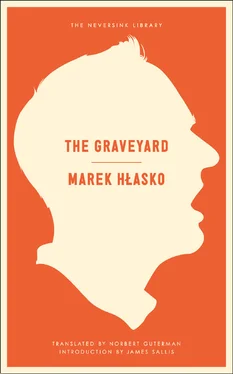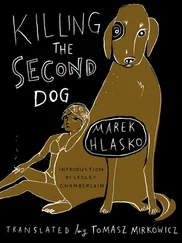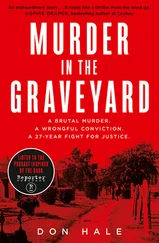“I do see,” Franciszek said. “Wherever I turn I see things against which a man must stand up and fight. Is there still any fight and any meaning left?”
“I see something else,” Jerzy said, staring into a corner of the room. Then he began to speak very fast, choking on his own saliva. “I see emancipated man. Man who was victorious over himself and renounced himself. There is no other victory. This is the ultimate purpose: not to think of yourself in victory. Every conqueror must first kill himself …” He turned away, and Franciszek saw with horror that tears were rolling down his sunken cheeks. “Man,” Jerzy stammered, raising his fists above his head, and shaking them helplessly. “Man, man was everywhere. At the ends of the earth, on mountain peaks, and in the ocean depths. He invented the multiplication table and the atomic pile, motion pictures and radio, the steam engine and penicillin; he was in concentration camps and in crematoria, and yet he lives, is reborn, multiplies. There is life for you; there is victory. And you ask about faith. Where is your faith, you brute?” he cried wildly. “Where is your faith? I haven’t changed; I was, I am, and I will be as you have known me to be. Once again you don’t trust me. Once again you are sending your spies to my house.” He stretched out his arm in a theatrical gesture and pointed to the door. “Get out!” he cried. “I don’t want to see you. I don’t want to see anyone. I have done what you asked of me, and now let me alone …” He stood silent as a statue for a while, and then threw himself on his knees before Franciszek: “Forgive me,” he whispered. “I know a great deal. I know everything; I can be useful. I know what people think — all of them, all, all. We’ll get into every thought, every action, every corner of the human brain, even where thoughts are born. But that’s not true,” he cried. “There are no bad thoughts. It’s possible to think only the way we want, or not to think at all. Other thoughts are useless. We’ve had enough thoughts that lead to nothing. Now we must conquer.” He kissed Franciszek’s hand with his slobbering mouth. “We’ll conquer,” he squeaked. “We’ll conquer everything. Only some things must be changed. We’ll conquer even dreams; stupid dreams can also lead to deviations. We must conquer dreams!” he shouted with ferocious strength, pinching Franciszek’s arms with his bony fingers. “That will be our task. And now, sing.”
He sang shrilly, staring at Franciszek with murky eyes: “This is the fi-nal …”
His arms were twitching convulsively; tears seeped through his fingers with which he had covered his decrepit face. He looked hideous; his gray head shook pitifully on his thin red neck. Franciszek sat rigid and half unconscious from horror. Someone jerked his arm.
“Go now,” the woman said. “Please, go now.”
He silently put on his overcoat.
“Didn’t you know?” she said.
“I didn’t.”
“He was arrested,” she said. “They kept him two years. They questioned him in their own way. He won’t tell me, even me, how it was. Every time a visitor comes, he thinks it’s someone sent from there. That’s why he has those terrible fits …” She came close to him. “You really didn’t know that he is …” She hesitated.
“He’s not the only one,” Franciszek said. “Everybody is. Please, never mention me to him.”
“He doesn’t understand anyhow,” she said.
“So much the better for him. Good night.”
HE WAS ABOUT TO CLIMB THE STAIRS IN HIS apartment house, when someone called after him, “Hey, Citizen Kowalski.”
He stopped. It was the janitor, a miserable-looking fellow in a shoddy blue jacket. They stood silent, looking at each other; the janitor’s expression betrayed embarrassment. A few floors up on the staircase, two men were carrying something large and heavy; they were noisy, and one kept crying to the other, “Stefan, take it sideways …”
“What’s the matter?” Franciszek asked. And when the other did not answer, he repeated: “What’s the matter, Citizen Superintendent?”
The janitor stared a few more moments with doglike eyes, then turned on his heel and went back to his room. Franciszek shrugged and began to climb the stairs. He was surprised: despite the late hour tenants were standing outside almost every door — women in wrappers, men with their suspenders hanging, some old men, some students; even a drunken soldier had strayed in from somewhere. All of them were whispering and gesticulating feverishly; their eyes betrayed great excitement; but when Franciszek passed them, the whispers ceased, and the people retreated into the shadows. On one landing, an elderly man was trying to open his window; he tugged vainly at the brass handle, repeating angrily, “The young, the young …” “Where are these people from?” Franciszek thought sleepily. “Why are there so many people in this house?” He kept bumping into them, forcing his way through them: he lived on one of the upper floors, and walked very slowly; he was tired, so tired that he became aware of the sweetish smell of gas only when he reached the dark corridor leading to his door — his door which was bashed in and hung crookedly on one hinge. Out stepped a man in a rubber apron, with a mask on his face.
Elzbieta was lying on her side, curled and strangely twisted like a bird that has been shot down. The veins in both her arms had been opened in two places, below the elbows and above the wrists. The doctor had finished packing his case; two male nurses stood beside him, holding their masks. The blood had already coagulated and hardened; the wind blew through the smashed window, tearing at the curtain. The doctor looked at Franciszek and said, “About two hours ago.”
Franciszek nodded. With firm steps he walked to the table, took the envelope and opened it. “Forgive me,” she had written, “but this is the best thing for me to do. You were expelled from the party and Mikołaj left home; Mikołaj left home and I was expelled from the university — children of people expelled from the party have no right to study. I broke with Roman because of a statement he voluntarily made and signed — that it was wrong of him to live with the daughter of a man like you. I don’t want this chain of events to reach my child, and it is too late to prevent it in any other way. The money is in the cupboard. The laundress will come on Tuesday. Farewell.”
The doctor asked: “Will you come with us to the morgue?”
“To the morgue?” Franciszek said with surprise. “No.”
“Can I do anything for you? Shall I give you a sedative?”
“Oh,” said Franciszek, annoyed, “leave me alone …” He walked to the bed and looked at Elzbieta’s rigid face. The bed stood near the window, and whenever the wind lifted the curtain a red glow flickered in Elzbieta’s milky eyes. “Where does this light come from?” Franciszek murmured. He turned to the doctor. “Are you sure?”
“Try to get some sleep,” the doctor said. “Tomorrow you’ll have to attend to the formalities.”
“All right,” Franciszek said. “But tomorrow.”
“Of course.”
One of the nurses said, “We had to smash a window,” and waved the mask he was holding. The other said: “There is a glazier across the street. I live there. Shall I write down his address for you?”
“Thanks,” Franciszek said. “I’ll remember. Across the street, you said?”
“Yes.”
They walked out, bending under the burden; the doctor smiled stupidly and walked out too; for another moment Franciszek heard their footsteps on the stairs, and the murmur of voices; then the draft slammed the door shut. He raised the collar of his overcoat and went to the window; another gust of wind lifted the curtain, and he understood where the red glow in Elzbieta’s eyes had come from. The neon sign was blazing triumphantly, with assurance; even the missing letters had been replaced. In the dirty starless sky, above the damp mass of the city, the enormous letters quivered. This time he read them carefully, one by one, like something hitherto unnoticed and now discovered for the first time.
Читать дальше






![Ричард Деминг - Whistle Past the Graveyard [= Give the Girl a Gun]](/books/412176/richard-deming-whistle-past-the-graveyard-give-t-thumb.webp)


